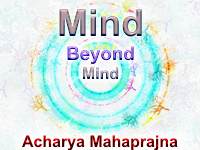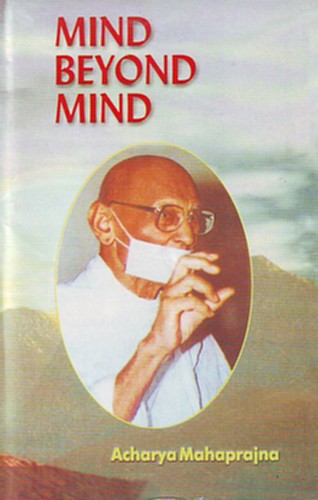
The purpose of sound in Anupreksha is to break the predilections and old prejudices and to create correct tendencies. There are vibrations of sound. Speech produces vibrations, which spread in the atmosphere strike objects and affect them. We are doing this every day. Every act of ours produces vibrations, which affect things and leave traces on them. The world is in a process of revolutions and no body can escape their effects. People say that Lenin and his comrades brought about a revolution in Russia. Russian scientists have now begun to tell a different story. They say that the Russian revolution has the result of a terrible explosion in the sun. The main cause of the revolution was not the revolutionaries but this explosion. Explosions in the sun affect the minds of men. Epidemic diseases on the earth, violent cyclones on the sea and huge earthquakes and terrible wars, mark the years in which gigantic explosions take place in the sun.
The question whether it is possible for us to protect ourselves from these terrible happenings is a pertinent question. Can we guard ourselves against them? Sound serves as such a protection. We perform Anitva Anupresha in the early hours of the morning. Every participant in this meditation sits resolved to meditate. He becomes calm and poised. The meditation begins with the incantation, 'This body is transient.' We meditate on the idea of the transistorises of the world. The second incantation is, 'This body is subject to growth and decay.' The third incantation is, 'The body changes.' It changes under the pressure of heat and cold and due to the food we eat and sometimes due to the atoms assailing us from outside our bodies. It changes due to diseases and sometimes due to our dispositions also. It is subject to the law of transformation. We can perceive these transformations through the medium of sound. It is necessary to associate sound with resolve.
You might have heard of recluses sitting stark naked on the snow covered peaks of the Himalayas surrounded on all sides by nothing but snow. They begin producing heat by exerting themselves. The heat emanating from their bodies makes them sweat profusely. The snow becomes drenched in the sweat. This is not a natural event. It is caused by sound, disposition, and the resolution of the recluses. It is a change brought about by volition. Similarly, if a practitioner who sits in a yogic posture in the midst of intense heat, and develops in his mind the idea of cold, his ideomotor action produces such an amount of cold that he begins to shiver, so much so that even a thick blanket will not be able to ward the cold off. This is an ideational and not a supernatural change. There is a certain gentleman who feels and develops in his mind the idea that he is Christ himself. Every Friday he mounts an improvised cross. Wounds appear on his palms and chest and they actually begin to bleed. This happens every Friday. It is an ideational reaction, which happens in his body. Take the example of corns growing in the cuticles which happens in particular seasons and which produce pain. If you begin to feel imaginatively that you have developed corns and are feeling pain in the cuticles, you will come to have the real pain even when there are no corns in the cuticles. You can also stop the pain at will. This is called the application of Bhavana (ideational mood).
The fourth incantation in Anitya Anupreksha meditation is, 'This body is subject to decay due to old age and it must die.' You can imaginatively feel death approaching. In such a state you should completely immobilize the body and try to feel as if you are dying. Within a short time you will begin to feel that death has approached. This again is an ideational change in you. You do not actually die, but the feeling that death has actually come will seize you. This Anupreksha is a perception of the transistorises of the body and the world. We perceive what are happening and the causes of it. Sound plays an effective role in this meditation. Sound and imagination are important bases of this meditation. This, however, is only a particular stage in meditation. You have to pass through this stage.
In the incantation of the sound Arham the practitioner tries to feel atonement with the state of Arhat. Next with a subtler incantation of the sound he tries to transplant himself into the state of Arhat imaginatively. We have different experiences at different stages. Dependence on some kind of symbol is the natural tendency of the human mind. Let us keep one thing in mind in this connection. It is not possible to divert the mind from a gross to a subtle thing easily. Preksha meditation is based on the idea that the practitioner's mind should be gradually orientated towards the subtle. Quite a few practitioners prefer to concentrate on a gross object rather than on a subtle one. This preference can be appreciated and they should be allowed for the simple reason that the practitioner's mind should not feel helpless in the initial stages- several practitioners complain that they are not even able to concentrate on breathing. Keeping in mind all these difficulties of the practitioners it is desirable to begin concentrating on gross objects rather than on subtle ones and to orientate the mind only gradually towards the subtle. But we should not loose sight of the ultimate aim, which is a complete orientation of the mind towards the subtle states. Very few practitioners are able to concentrate directly on abstract ideas.
A disciple once approached his Guru to seek guidance in meditation. The Guru asked him if he had eyes, which could see and ears which could hear. If he had them, why should he ask the Guru to guide him? Let him see and hear. Then he asked the disciple to go to the hill beyond and start seeing it. The disciple did so, and began to concentrate on it and on the sound, which was being produced by a spring of water in the hill. Eventually he began to enter into a state of meditation.
The basic thing in meditation is to see. You may perceive an object of vision or a sound or anything you like. You have simply to behold and do nothing else. Don't add anything from the mind to your act of seeing. You should carefully avoid coloring your perception with a predisposition of the mind. Keep your perception a simple perception. See and know that is the watchword. You may fix your eyes on a wall, or on your breath, but do not allow your mind to interfere with the act of perception.
The Jain Agamas (scriptures) enjoin on the monk to keep his eyes fixed on the ground while walking with his mind absorbed in the rhythm of the gait. This is a complete act of meditation. It is called Gamana Yoga (Yoga in walking). This practice poises the monk towards a higher stage of meditation. The Uttaradhyana Sutra says that a monk, while he is walking, should feel the rhythm of the gait and become dumb and blind towards everything else. He should suspend his ego and allow the autopilot in him to guide his steps. You may logically ask how can the monk forget himself. There can be no walking unless there is some one who walks and he who walks must be conscious of the fact that he is walking. This is, of course, a logical argument. The fact of the experience, however, is that in such a situation the ego-consciousness disappears into the rhythm of the gait. In it the sense organs and the mind cease to work. There is no thinking, no thoughts. There are no questions, no answers. The eyes do not see, nor do the ears hear anything. What remain are the momentum, the rhythm, and nothing else. The monk simply sees the ground before him and feels the mystery of the rhythm.
Breathing should not be taken to be the only object of concentration. Concentration on walking is also a tangible concentration. Haribhadra Suri has said that all the details of religious practice are Yoga because they aim at the emancipation of the soul. You may adopt any object to meditate upon. I may add another thing. Even eating can be an honourable object of the concentration of the mind. You may not do anything else except eating. But you should do it earnestly without allowing your likes and dislikes and tastes to interfere with the act of eating. Eating will thus become an act of meditation, whether you approve of it or not.
 Acharya Mahaprajna
Acharya Mahaprajna

